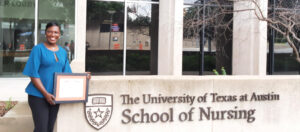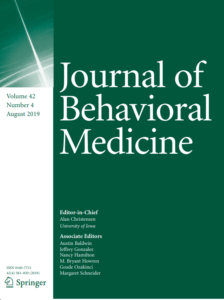
The SoNStar for the Summer 2021 session is Angela Bigham, a Lay Health Worker for the AMEN program and a Community Health Network Leader for The Alliance for African American Health in Central Texas. Congratulations Angela Bigham!
Angela received several nominations. She has a contagious sweet spirit, is outgoing, caring, ready to jump in and support others in any way they can at all times, and serves with a genuine heart. She takes the time to communicate ideas and opportunities to UTSON faculty/staff on how to engage with the community to ensure that individuals being served are supported based on their needs. She follows up with people in need, ensures that the solutions provided are maintained, and works to offer practical, sustainable solutions when more support is needed.
Angela works tirelessly to support the community both within and beyond the AMEN program – VaxNow and VAMOS initiatives. She has dedicated numerous hours each day calling community members to schedule their COVID vaccination appointments, assists at the mobile clinics to ensure that people have a positive experience, and offers education and reassurance to those who are uncertain or fearful about getting vaccinated.
Angela has gone above and beyond her duties, such as driving to congregant’s homes to drop off supplies, assisting with home care needs, and ensuring that individuals have access to healthcare providers. She has gone to great lengths to ensure congregants receive calls, education, and have access to local resources. Angela also runs a community garden, offer healthy cooking classes for the community, and delivers fresh produce to homebound adults. She spearheaded an event during COVID to cook greens from the garden and deliver a warm meal to homeless residents in the community.
Angela readily steps up to do needed tasks, works hard to learn the designed system, streamlines it, makes it more achievable, and constantly adapts to the work that needs to be accomplished. Her energy and willingness to serve is infectious and inspires other team and community members to join her efforts. She inspires us all when we get weary.
 We talked to Gayle M. Timmerman, a researcher at the University of Texas at Austin School of Nursing about her latest research and how she contributes to the mission of HER.
We talked to Gayle M. Timmerman, a researcher at the University of Texas at Austin School of Nursing about her latest research and how she contributes to the mission of HER.

